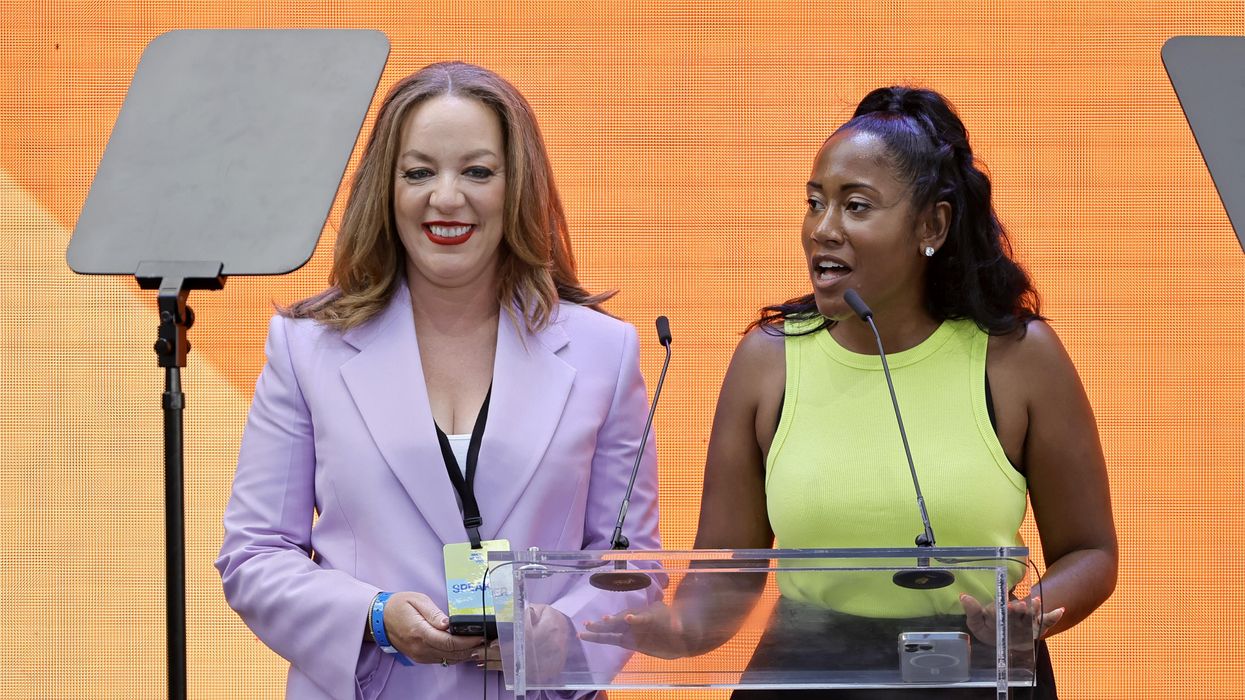With less than a week remaining for all ballots to be cast, one of the nation’s premier voter engagement organizations is in the final stages of its efforts to maintain the record turnout from the two previous elections.
Vote.org, which runs voter registration and get-out-the-vote efforts, has seen tremendous use of its services even after Americans broke a 100-year-old midterm turnout record in 2018, said CEO Andrea Hailey.
“In key states like Georgia, Arizona, Pennsylvania ... we’ve seen over 100 percent growth compared to 2018,” Hailey said. “It’s about 91 percent of the traffic that we saw in 2018, but in key states we’re seeing these huge increases.”
Those states and others such as Florida, Nevada, New Hampshire, North Carolina and Ohio are home to hard-fought races for Senate and governor that will decide the direction of federal and state policymaking for years to come.
The final days of election season will feature a focus on voter education, as well as a continuation of ongoing outreach efforts.
“Now that we’re touching one in five Americans, we need to make sure we remain a trusted source of information,” Hailey said, specifically noting the confusing nature of provisional ballots. “On election night we’ll be there to ensure people understand what’s happening.”
With states changing their election laws in the wake of the 2020 presidential contest, which was the subject of false allegations of fraud by supporters of Donald Trump, Vote.org has had to adjust its plans accordingly.
“It was frustrating. On the heels of the highest turnout we’ve seen in 100 years, it was sad. We should have been celebrating but we saw hundreds of voter bills circulating,” Hailey said.
She referred to such bills as “death by a thousand cuts,” claiming they are a collection of efforts to limit who votes.
Hailey pointed to the “wet signature” laws passed in Texas and Georgia that require people to print, sign with ink (hence the wet signature) and mail voter registration forms rather than completing an online form.
“When we have the technology and know it’s working, to say digital signature is no longer valid is preposterous,” she said. “That directly affected our users. We could no longer provide the tool.”
Some of the group’s resources in the coming days will be applied to combating misinformation even though Hailey believes that problem isn’t as intense now as it was in 2020 when voting by mail was the subject of harmful disinformation.
“I’m concerned when people say preemptively that they’re going to contest elections if they don’t win,” Hailey said, noting her organization has a partnership with Twitter to provide nonpartisan information. “We’ll be ready to respond with the facts and the actual truth.”
Up until these final days of the campaign, the focus has been on registering voters and encouraging them to cast ballots. Hailey said Vote.org had more users than all previous years combined in 2020, and while it may not match those numbers, there are other areas of growth.
“Our get-out-the-vote program this election is much larger,” she said, explaining the organization has focused on engaging young voters and communities of color – reaching 60 million people through its radio program alone.
Vote.org has created a multipronged approach to reaching those communities: advertising (digital, streaming services, student newspapers) and partnerships (WhatsApp, Pinterest, the NAACP’s Youth & College program, the College Board, and universities). There has been an 11 percent increase in the use of the Vote.org platform by members of Generation Z and millennials, according to the group’s representatives.
The group has also recruited influencers who have helped spread the word about voting, including Taylor Swift and Josh Gad.
“There are only 20 midnights until the 2022 United States Midterm Elections on November 8,” Swift wrote in an Instagram story last month that linked to Vote.org. (Her newly released album is titled “Midnights.”) She also used the post to encourage early voting.
Gad has also used his social media platforms to encourage voting in the final days before Nov. 8.
A secondary level of outreach includes a series of partnerships with micro influencers supporting efforts on a state-by-state basis as well as YouTube gamers who agreed to use portions of their videos to encourage voting.



















 Senate Committee on Commerce, Science, and Transportation ranking member Sen. Maria Cantwell (D-WA) (R) questions witnesses during a hearing in the Russell Senate Office Building on Capitol Hill on February 10, 2026 in Washington, DC. The hearing explored the proposed $3.5 billion acquisition of Tegna Inc. by Nexstar Media Group, which would create the largest regional TV station operator in the United States. (Photo by Chip Somodevilla/Getty Images)
Senate Committee on Commerce, Science, and Transportation ranking member Sen. Maria Cantwell (D-WA) (R) questions witnesses during a hearing in the Russell Senate Office Building on Capitol Hill on February 10, 2026 in Washington, DC. The hearing explored the proposed $3.5 billion acquisition of Tegna Inc. by Nexstar Media Group, which would create the largest regional TV station operator in the United States. (Photo by Chip Somodevilla/Getty Images)
